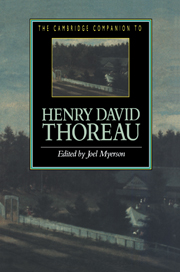Book contents
- Frontmatter
- 1 Thoreau’s reputation
- 2 Thoreau and Concord
- 3 Thoreau and Emerson
- 4 A Week on the Concord and Merrimack Rivers
- 5 Thoreau as poet
- 6 Thoreau and his audience
- 7 Walden
- 8 Thoreau in his Journal
- 9 The Maine Woods
- 10 A wild, rank place
- 11 Thoreau’s later natural history writings
- 12 Thoreau and the natural environment
- 13 Thoreau and reform
- Further reading
- Index
- Series List
13 - Thoreau and reform
Published online by Cambridge University Press: 28 May 2006
- Frontmatter
- 1 Thoreau’s reputation
- 2 Thoreau and Concord
- 3 Thoreau and Emerson
- 4 A Week on the Concord and Merrimack Rivers
- 5 Thoreau as poet
- 6 Thoreau and his audience
- 7 Walden
- 8 Thoreau in his Journal
- 9 The Maine Woods
- 10 A wild, rank place
- 11 Thoreau’s later natural history writings
- 12 Thoreau and the natural environment
- 13 Thoreau and reform
- Further reading
- Index
- Series List
Summary
Thoreau notes in Walden that “moral reform is the effort to throw off sleep ” (W 90) and there can be no doubt that he himself was deeply involved in that effort throughout his lifetime. Indeed, a concern with reform of all types - personal, social, religious, and so on -permeates his published works, and a comprehensive discussion of the topic would necessarily touch upon all of them. However, this chapter will concentrate primarily on the writings contained in Reform Papers, which is based upon, but also adds to, an earlier collection, A Yankee in Canada, with Anti-Slavery and Reform Papers (1866). All my page references are to the Reform Papers text.
Over the years scholars have argued about the nature and extent of Thoreau’s commitment to enterprises for social reform. Some have held that “his first concern was not society; it was man himself, ” and that because of his nearly exclusive emphasis upon self-reform he tended to ignore the larger, collective social dimension.' Others have concluded that "Thoreau was no social reformer," or that, more broadly, "the troubles of mankind caused him no disturbance," or that, if occasionally the press of public events would draw him forth to "deliver jeremiads on the evil of his times," he would soon "draw back and do nothing more, insisting that he had other more important affairs to attend to."
On the other side, some critics have seen him as something of a curmudgeon who was entirely too concerned with the moral rectitude of his neighbors and too willing to offer criticism of them. One such critic insists that Thoreau "believed in inspiration from on high, in his own inspiration, and in the inspiration of whoever agreed with him… . Yet there is a suppressed premise in the argument - the premise that this particular human being, Henry David Thoreau, is right, and that anyone who disagrees with him is ipso facto wrong."
- Type
- Chapter
- Information
- The Cambridge Companion to Henry David Thoreau , pp. 194 - 214Publisher: Cambridge University PressPrint publication year: 1995
- 5
- Cited by

